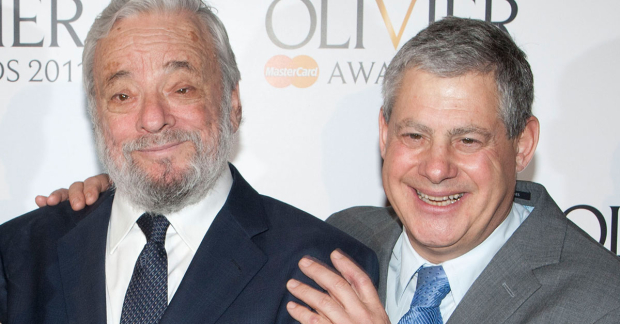Cameron Mackintosh on ”Stephen Sondheim’s Old Friends”: ‘We knew we had his blessing, and he helped shape it’

© Dan Wooller
Twas the week before Christmas, and all through Mackintosh House, final touches were being added to the broadcast version of Stephen Sondheim’s Old Friends, the 130-minute celebration of the late, great composer and lyricist – responsible for the likes of Follies, Sweeney Todd, A Little Night Music, Sunday in the Park with George, Company and so many more.
Conceived and produced by Cameron Mackintosh, it was originally performed live in May at the Sondheim Theatre, acting as a fundraiser for the Stephen Sondheim Foundation, created in Sondheim’s will to help early-stage writers and composers.
Sitting and chatting to Mackintosh that week inside his office, overlooking Shaftesbury Avenue and nestled above the Gielgud Theatre, naturally a large portion of the conversation revolved around Sondheim’s unceasing creative endeavours, and the historic “Old Friends” event. Reverentially, Mackintosh described it as: “It was one of the most special nights for one of the most special men of all time.”
On the wall in Mackintosh’s office was a portrait of Sondheim, courtesy of Francis Hamel – a striking piece from 2015, it seems to show the musical master bristling with a glowing fervour, aware that he has a creative itch to scratch. It felt alive, quietly smouldering as Mackintosh discussed his old friend.
Stephen Sondheim’s Old Friends may have felt like a direct response to Sondheim’s passing, but its origins came a lot earlier. Mackintosh explains: “The germ of the show was started during Covid, with me and Steve. Steve was obviously locked up in Connecticut and I was in Somerset, wondering ‘what on earth are we going to do to get everything back up'”.
It was at this time that Sondheim suggested a follow-up to two of the pair’s previous musicals revue productions – Side by Side by Sondheim, which premiered at the (now defunct) Mermaid Theatre in London in 1976, followed by Putting it Together, first seen in Oxford in 1992 and produced by Mackintosh alongside Julia McKenzie before being staged on Broadway and in London.
In the midst of isolation, the pair started to work, Mackintosh says: “Putting It Together was never seen all that much, and initially we really wanted to do something different to Side by Side. We started writing our own lists – some things he put on his lists, some things I put on mine. Then all of a sudden lockdown was coming to an end and we had to go back and try and get shows on – he had Company on Broadway, amongst other things, and I had all of my productions across the world.
“I did see him at the end of the last year, just before he died, and we touched on the revue again. But by and large we hadn’t developed it much further, other than him saying ‘we must really get this done.’ His death came and, over the Christmas holidays last year I collated his notes and my notes, and brought it all to Matthew [Bourne, who co-directed the evening with Maria Friedman] and it went from there.”
Mackintosh was quick to assemble a mighty group of performers, including Judi Dench, Imelda Staunton, Mackenzie (performing for the first time in 20 years), Michael Ball, Gary Wilmot and more. But there was only one place to start: “Bernadette Peters was one of the first people I rang, as I’d known her a long time and obviously she’d done Hey Mr Producer and had worked with Stephen for so long. So we worked out her material – for instance I didn’t have “I Know Things Now” on my original list, but she suggested doing that as an older woman, blurting it out during our conversation. She even tested that out during her tours in North America – just to make sure it worked – and it was so brilliant and clever.”
Having watched both the original concert and the upcoming BBC broadcast (god it’s good), it’s easy to feel Sondheim’s fingerprints on everything – the seamless transitions between musicals, the neat, self-contained peppering of narratives in individual numbers. He may have only been there at its conception, but he’d most certainly have enjoyed the result.
Is Mackintosh happy with how the broadcast turned out? It’s important to note that this isn’t a carbon copy of the show that was live-streamed to Mackintosh’s Prince Edward Theatre down the road from the Sondheim Theatre in May: “Honestly I’m thrilled that we spent such a long time editing it down for the BBC. It works remarkably well on screen. Obviously there’s such an incredible array of talent, but some of the things we can do on the screen – getting right into people’s eyes – it just makes you want to watch it again. The material held together absolutely brilliantly.”
“What was so interesting was that so much of the end result came from my work with Julia as well as Steve. A lot of what fit together so effortlessly had partly come from having done it in previous versions – we knew we had his blessing, and he helped shape it. That’s why after decades and decades of knowing each other, it all seemed to fall pretty effortlessly into place, given it was so flawlessly put together.”
That didn’t mean that there weren’t some happy accidents along the way: “Haydn Gwynne, for example, was only meant to originally do “The Little Things” with Rob Brydon – before a small hiccup. The Saturday before the show on the Sunday, Hannah Waddingham, who was meant to be singing “Ladies Who Lunch”, rang me and explained she had no voice at all and was absolutely gutted.
“We didn’t know what to do – so I went up to Haydn before she began rehearsals and explained the situation. This was one of the weirdest coincidences though – she turned to me and said ‘I can’t believe you’re asking me this – I haven’t sung this song in 12 years or so but I’ve actually got the sheet music with me as I was about to take it to my vocal coach.’ So there were a few wonderful miracles and the gods of the theatre were in the right place to make it happen.”
I bring up the exciting newer talents that stand shoulder-to-shoulder with some of the musical greats – Holly-Anne Hull, Desmonda Cathabel, Rob Houchen, Shan Ako or Christine Allado as examples. Mackintosh nods and smiles enthusiastically – “Hopefully we’ll find even more stars next time we do it!” It definitely feels as though we’ll be hearing a whole lot more from Old Friends in 2023.
Mackintosh had plenty more to say about Sondheim (including his unfinished final musical), the state of the West End, Broadway and his long-running shows – so come back next week for the second part of this interview.
Stephen Sondheim’s Old Friends will be broadcast on New Year’s Eve at 5.35pm.














